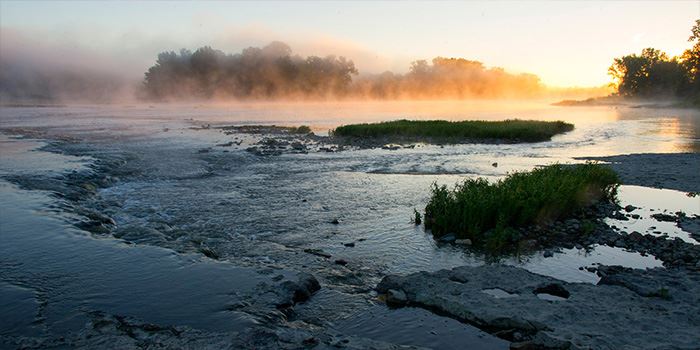Water Quality

When you turn on your faucet to fill a glass, do you think about where your drinking water comes from?
Do you enjoy fishing, paddling, or simply relaxing by the water?
Have you ever enjoyed watching a fish swim in a river, a bird wading to catch food, or a deer drinking from the water?
There are a lot of reasons to care about the water quality of our streams, rivers, and lakes, both for our own human needs and for the needs of the wildlife that depend upon them. Unfortunately, at this time most of our local water bodies are considered impaired by the EPA and need our help.
This may seem like an overwhelming challenge outside of your control, but there is good news! Actions by individuals and communities do make a difference and we are seeing slow improvements in water quality due to these actions.
How can you help? Explore the actions below that you can take to improve local water quality.
Want to track your impact and see how your actions pay off? Take a Clear Choices Clean Water pledge and see how your impact adds up. https://toledolakeerie.clearchoicescleanwater.org/
- Reduce nutrient run-off: While we haven’t had a drinking water crisis locally since 2014, the culprit responsible has not gone away. Harmful algal blooms continue to plague Lake Erie and even the lower Maumee River. Excess nutrients, especially phosphorus, are what is driving these harmful algal blooms.
To help:
- Limit your use of fertilizers and always follow the label directions.
- Properly maintain your septic systems.
- Pick up pet waste.
- Dispose of harmful materials properly: Don’t pour harmful substances down the drain, onto the ground, or into sewer drains. All of these can contaminate surface or groundwater. Beware of:
- Motor oil
- Pesticides
- Left over paint
- Some household cleaners
- Certain medications
For a list of locations to properly dispose of these items locally, see the resources listed by the City of Toledo: https://toledo.oh.gov/residents/neighborhoods/trash-recycling/how-to-dispose-of-different-materials
- Reduce sediment run-off: Sediment is a major source of pollution in our surface waters. Reduce sediment run-off on your property or workplace, especially anytime construction or projects involve exposing bare soil.
- Limit your use of chemicals: In addition to fertilizer, pesticides and salt used for de-icing can also negatively impact water quality. Read the labels and apply them appropriately. Avoid over-application to minimize impact.
- Slow down or keep water on your property: Slowing water decreases storm-water runoff, which can decrease flooding, stream bank erosion, and the amount of pollutants being washed into a waterbody during a storm event.
- Connect your downspouts to rain barrels, then use the water you’ve collected to water plants in dryer times.
- Plant a rain garden to catch excess storm water and allow it to infiltrate slowly into the ground.
- Volunteer in your community: There are already organizations working hard to improve water quality in the Toledo area. Volunteering your time with these organizations can increase their impact. Some local organizations to consider volunteering with include:
- Partners for Clean Streams
- Lucas County Soil and Water Conservation District
- Metroparks Toledo- water quality monitoring and stewardship volunteer opportunities available
- Keep Toledo Lucas County Beautiful
- Ohio Department of Natural Resources
- The Nature Conservancy
- Lake Erie Waterkeepers
- TMACOG
- Support initiatives and legislation that improve water quality: Projects that restore or improve wetlands, floodplains, streams, and ditches, and projects that involve improvements to wastewater storage, transportation, and treatment can all improve water quality.
- For information on some of the projects and initiatives underway in Toledo see the City of Toledo’s water quality page here: https://toledo.oh.gov/residents/water/quality#:~:text=The%20goal%20of%20the%20Toledo,separation%2C%20and%20improved%20wastewater%20treatment.
- For information on policies to consider supporting to improve water quality see TMACOG’s Agenda for Lake Erie here: https://tmacog.org/water/agenda-for-lake-erie
Improved water quality is possible if we all work together. Maybe the next time you watch a wading bird or drop a fishing line, a cleaner, clearer river will be looking back at you.